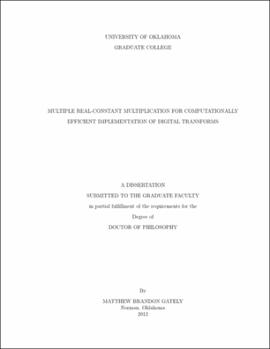| dc.contributor.advisor | Yeary, Mark B | |
| dc.creator | Gately, Matthew Brandon | |
| dc.date.accessioned | 2019-04-27T21:25:00Z | |
| dc.date.available | 2019-04-27T21:25:00Z | |
| dc.date.issued | 2012 | |
| dc.identifier | 99170597202042 | |
| dc.identifier.uri | https://hdl.handle.net/11244/318631 | |
| dc.description.abstract | The need to multiply signals by vectors (or matrices) of constants is fundamental and frequently arises in many areas of electrical and computer engineering. | |
| dc.description.abstract | In their hardware implementations, performance issues such as circuit area, delay, and power consumption heavily influence the design process. | |
| dc.description.abstract | It is well known that multiplication of a signal by a constant can be implemented multiplierless as a network of shifts and additions, and that these computational networks, termed shift-add networks, can lend to higher performing circuit implementations than when using general multipliers. | |
| dc.description.abstract | There is a rich body of work on the optimization of shift-add networks, known as the multiple constant multiplication (MCM) problem. | |
| dc.description.abstract | However, the optimization strategies that have been developed for the MCM traditionally assume that the vector multiplications being optimized always stem from integer constants. | |
| dc.description.abstract | This assumption breaks down for many real-world applications, where the target constants for MCM optimization are real numbers rather than integers. | |
| dc.description.abstract | In these situations there is flexibility in how constants are quantized in digital circuits that can be leveraged. | |
| dc.description.abstract | Thus, it is desirable to have a method of jointly optimizing both the constant quantization error and the shift-add network simultaneously. | |
| dc.description.abstract | This dissertation addresses this need by providing a problem framework and algorithms for joint quantization/MCM optimization and, through a series of experiments, shows that there is a potential for tremendous benefit when the optimization of quantization and shift-add networks is executed in one unified problem framework. | |
| dc.description.abstract | After reviewing the relevant work, this dissertation rigorously develops the aforementioned joint optimization framework, describing the metrics used for quantization error, and culminates in a formal problem statement. | |
| dc.description.abstract | We call this joint optimization problem the multiple real-constant multiplication problem (MRCM) in order to distinguish it from the traditional MCM problem that operates exclusively with integer constants, which we hereafter refer to as the multiple integer-constant multiplication (MICM) problem. | |
| dc.description.abstract | Then, we consider three different cost models used for evaluating shift-add networks and, with each model, we determine the potential advantages of using our MRCM framework over the traditional MICM approach. | |
| dc.description.abstract | First, we consider the traditional adder-count cost model. | |
| dc.description.abstract | We start by formally defining the MRCM problem in the context of this cost model, and then describe a series of theoretical developments centered around finitizing and pruning the search space, leading to an efficient algorithm for solving the problem. | |
| dc.description.abstract | Next, via extensive randomized experiments, we show that our joint framework leads to a reduction on the number of adders by 15%–60% on moderate size problems. | |
| dc.description.abstract | In particular, for vectors of arbitrary constants, we show a possibility for 20%–60% reduction with less than 10% vector approximation error for both frameworks, whereas for vectors of low-pass filter coefficients, a 15%–30% reduction is possible without exceeding 10% error in frequency response. | |
| dc.description.abstract | Second, we consider an adder-bits cost model, whereby instead of simply counting the number of adders, we compute the combined bitwidth of all the adders. | |
| dc.description.abstract | To solve the MRCM problem in this context, we introduce two search algorithms—one greedy and one optimal, each guided by a novel MRCM-aware heuristic. | |
| dc.description.abstract | Next, we discuss a randomized experiment, in which we compare both algorithms to an MICM-targeted heuristic. | |
| dc.description.abstract | We observe that the greedy search finds solutions with an average cost improvement of 13% over the MICM solution with the trials considered, and the optimal search finds an additional improvement of 6%. | |
| dc.description.abstract | Third, we consider a prominent gate-level cost model from the literature that. | |
| dc.description.abstract | This gate-level model consider the bitwidths of an adder's inputs and output along with the relative alignment of the inputs/output due to bit shifting, when computing the adder cost. | |
| dc.description.abstract | To solve the MRCM problem in this context, a novel greedy algorithm is developed that uses a functional programming approach to solving the MRCM problem. | |
| dc.description.abstract | Next, we experimentally show this algorithm to offer an improvement of up to 18%, over a competing MICM algorithm, on small instances having 20 8-bit constants, increasing to up to 59% improvement on larger instances having 80 5-bit constants. | |
| dc.description.abstract | Finally, we conclude the work by offering recommendations for possible future work in the development of efficient MRCM algorithms and novel problem formulations for optimizing MCM circuits. | |
| dc.format.extent | 103 pages | |
| dc.format.medium | application.pdf | |
| dc.language | en_US | |
| dc.relation.requires | Adobe Acrobat Reader | |
| dc.subject | Algorithms | |
| dc.subject | Transformations (Mathematics) | |
| dc.subject | Mathematical optimization | |
| dc.title | Multiple Real-Constant Multiplication for Computationally Efficient Implementation of Digital Transforms | |
| dc.type | text | |
| dc.type | document | |
| dc.thesis.degree | Ph.D. | |
| ou.group | College of Engineering::School of Electrical and Computer Engineering | |
